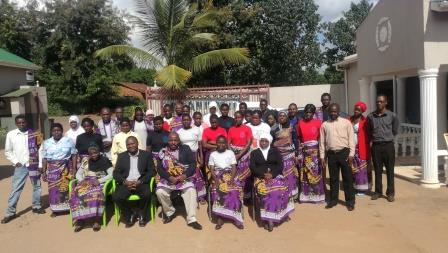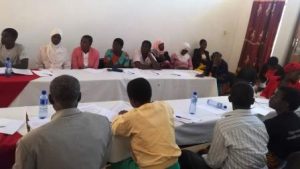
MULANJE, Malawi – Centre for Solutions Journalism (CSJNEWS), a local human rights organisation, has described the Global Gag Rule as big blow to grassroot sexual and reproductive health initiatives in rural Malawi.
CSJNEWS executive director Brian Ligomeka made the observation during a training workshop for rural-based Sexual and Reproductive Health and Rights (SHRH) advocates from southern Malawi district of Mulanje on Monday.
The explanation was in response to a complaint from leaders of rural SRHR advocates who bemoaned that maternal deaths are on the increase in the district.
According to activists, this is so because a number of organisations which were running safe motherhood and family planning initiatives either had scaled down their operations while others have pulled out due to funding constraints.
“It is pathetic to see expectant women struggling to travel to health centres when their time to deliver is near. Organisations which promised to give us special-made bicycle ambulances have suddenly backtracked on their promises and have pulled out from some areas due to what they say are funding challenges,” complained Group Village Headwoman Tambala from the district.
In his response to the complaint, Ligomeka said the problem of funding challenges was not strange because most organisations dealing with SRHR issues have been negatively affected by brutal policy called the Global Gag rule which the current US administration is pursuing.
“We, too, are affected by this bad policy championed by those who do not understand the dynamics of SRHR at global level. We have failed to qualify for support from some prospective partners because we openly campaign for provision of safe abortion. Currently, we are running on a very tight budget,” Ligomeka said.
He, however, added: “Despite our tight financial situation, the Global Gag Rule will not deter us from carrying out our planned projects. We will struggle but that will not stop us from campaigning for access to comprehensive Sexual and Reproductive Health and Rights including the enactment of Termination of Pregnancy Bill.”
Ligomeka said the poor people whose relations are dying due to lack of access to SRHR services would also not be silent.
“The Global Gag Rule will not completely shut us up. Instead of ululating for saving lives, we will be weeping for the loss of our beloved ones who die from maternal deaths. The Global Gag Rule has replaced happiness with sadness in rural areas.”
The “Global Gag Rule, or the Mexico City Policy, requires that any overseas organization receiving US said to refrain from anything to do with abortion.
Some organisations are persuaded not even mention the word abortion. Organizations that disagree with this condition lose funding or fail to access funding.
Unsafe abortions

Taking a turn during the meeting, one participant told participants that unsafe abortions continue to claim many lives in rural areas.
“Just recently, we lost a woman who went to a herbalist to induce an abortion. When she started bleeding heavily, she decided to go to the hospital. Sadly she died on the way to the hospital. This is a problem which should be addressed.
Speaking on the sidelines of the training workshop, another participant said three women died due to unsafe abortions from one village within a month.
In his response, Ligomeka appealed to the rural SRHR advocates to speak with a strong voice on the need to enact the Termination of Pregnancy Bill, which has already been drafted by the Law Commission and submitted to Ministries of Health and Justice for presentation to cabinet and later Parliament.
“Let’s join hands in fighting for abortion law reform in Malawi so as to save thousands of women and girls who are dying from unsafe abortions,” he said.
According to Ligomeka, abortion is not about religion or culture. It is about the deaths of thousands of women, some of whom are sent to their early graves.
“We are happy that here in Mulanje District, liberal traditional and religious leaders, men and women, boys and girls are now speaking for themselves about the problem of unsafe abortion,” he said.
Ligomeka said the proposed Termination of Pregnancy Bill should be prioritized by lawmakers once it is tabled.
“We, at Centre for Solutions Journalism, would like to emphasise that it is important for Malawi to enact the proposed Termination of Pregnancy Bill, which has clear guidelines on provision of safe abortion so that deserving women and girls can have access to safe terminations of unwanted pregnancies,”
Loud call
Speaking during the same training workshop, CSJNEWS Board Member Rev. Fr. Martin Kalimbe said rural-based SRHR champions have an opportunity to campaign louder as Centre for Solutions Journalism has created a radio programme which will offer them a platform to air out issues affecting them.
“We are happy to announce here that CSJNEWS has created a radio programme where the people mostly affected by Sexual and Reproductive Health injustices including our draconian laws will speak for themselves.
“Let’s continue to remind the government about its obligation to fulfill what is enshrined in Sexual and Reproductive Health and Rights policies and laws including the Gender Equality Act.
Malawi Gender Act in Section 19 provides that: “Every person has a right to adequate sexual and reproductive health which includes the right to access sexual and reproductive health, access family planning services, to be protected from sexually transmitted infection, self-protection from sexually transmitted infection, choose the number of children and when to bear the children, control fertility; and choose an appropriate method of contraception.”
According to Rev. Kalimbe, the rural SRHR advocates should also take advantage of the radio programme which CSJNEWS is producing to express their views freely on all SRHR issues.
CSJNEWS, with support from Safe Abortion Action Fund (SAAF) is drumming up support for the enactment of the draft Termination of Pregnancy Bill in the southern African nation of Malawi where over 141, 000 abortions takes place annually.
Restrictive abortion law in Malawi is driving many women and girls in rural areas, mostly from poor families, to seek unsafe abortions.
According to health workers who offer post abortion care in hospitals, the use of poisonous substances, cassava sticks, knitting crotchets and even bicycle spokes to induce abortions is still rampant in Malawi where women who are found inducing abortion face jail terms ranging from 7 to 14 years.
While previously authorities were paying a blind eye to the problem, the startling statics [of 141,000 women who induce abortions annually through unsafe means, according to University of Malawi and Guttmacher research findings] have moved the Malawi government to draft the new Termination of Pregnancy Bill.
Despite having the draft bill ready, cabinet ministers, top government officials and lawmakers have grown cold and the abortion law reform process has slowed down.
CSJNEWS is among the local Malawian human rights organisation which is campaigning for speedy enactment of the law.
